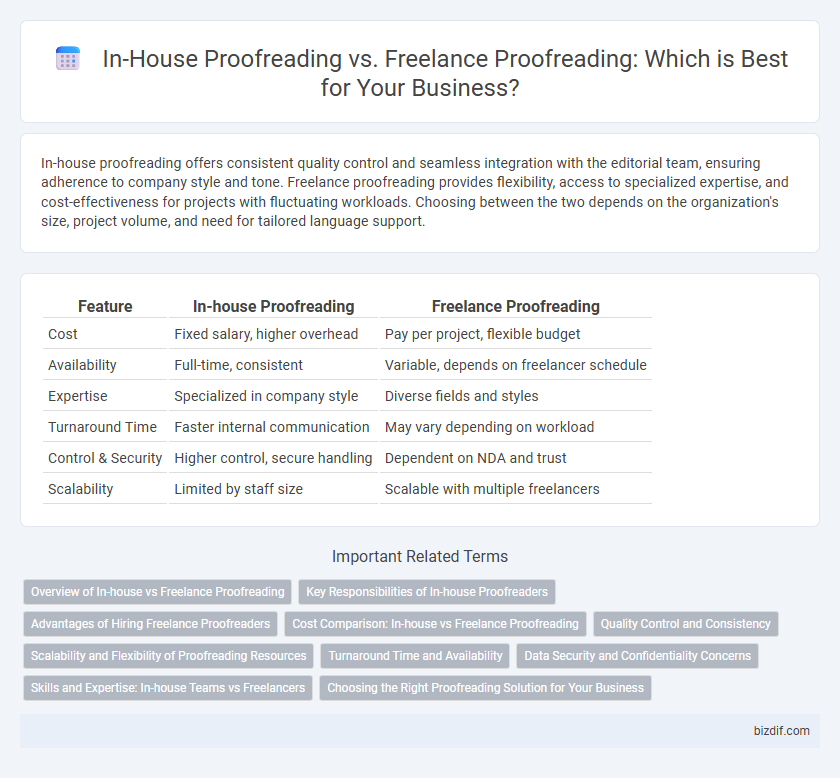In-house proofreading offers consistent quality control and seamless integration with the editorial team, ensuring adherence to company style and tone. Freelance proofreading provides flexibility, access to specialized expertise, and cost-effectiveness for projects with fluctuating workloads. Choosing between the two depends on the organization's size, project volume, and need for tailored language support.
Table of Comparison
| Feature | In-house Proofreading | Freelance Proofreading |
|---|---|---|
| Cost | Fixed salary, higher overhead | Pay per project, flexible budget |
| Availability | Full-time, consistent | Variable, depends on freelancer schedule |
| Expertise | Specialized in company style | Diverse fields and styles |
| Turnaround Time | Faster internal communication | May vary depending on workload |
| Control & Security | Higher control, secure handling | Dependent on NDA and trust |
| Scalability | Limited by staff size | Scalable with multiple freelancers |
Overview of In-house vs Freelance Proofreading
In-house proofreading offers consistent access to dedicated professionals who align closely with company standards and style guides, ensuring brand voice uniformity across all content. Freelance proofreading provides flexibility and access to a diverse range of experts with specialized skills, allowing tailored services based on project demands and varying workloads. Companies often weigh cost-efficiency, turnaround time, and control over quality when choosing between in-house teams and freelance proofreaders.
Key Responsibilities of In-house Proofreaders
In-house proofreaders are responsible for consistently maintaining brand voice and style across all company documents, ensuring accuracy and compliance with internal guidelines. They collaborate closely with writers, editors, and other departments to streamline production workflows and meet tight deadlines. Their key duties include thorough content review, error correction, and formatting verification within a controlled organizational environment.
Advantages of Hiring Freelance Proofreaders
Freelance proofreaders offer flexible scheduling and specialized expertise tailored to diverse projects, enhancing the quality and precision of your content. Hiring freelancers reduces overhead costs associated with full-time employees, providing a cost-effective solution for businesses of varying sizes. Their ability to scale workload quickly accommodates fluctuating demands, ensuring timely project completion without sacrificing accuracy.
Cost Comparison: In-house vs Freelance Proofreading
In-house proofreading typically incurs fixed costs including salaries, benefits, and overhead expenses, making it a consistent but potentially higher financial commitment for companies. Freelance proofreading offers flexible pricing models, often charged per word, hour, or project, which can result in cost savings, especially for businesses with fluctuating workload demands. Comparing cost efficiency depends on volume, turnaround time, and the complexity of the project, with freelancers providing scalable solutions while in-house teams offer immediate availability and deeper integration.
Quality Control and Consistency
In-house proofreading offers superior quality control and consistency due to ongoing collaboration within a dedicated team familiar with company standards. Freelance proofreading can vary in quality, as freelancers work independently and may lack alignment with specific brand guidelines or editorial processes. Maintaining consistent style and tone is more manageable with in-house proofreaders who regularly communicate and review shared materials.
Scalability and Flexibility of Proofreading Resources
In-house proofreading offers consistent quality control and dedicated team availability but often struggles with scalability during peak workloads. Freelance proofreading provides greater flexibility, allowing businesses to quickly adjust resource levels based on project demands and budget constraints. Access to a diverse pool of freelance proofreaders enhances scalability, ensuring timely delivery without compromising accuracy.
Turnaround Time and Availability
In-house proofreading offers faster turnaround times due to dedicated staff who prioritize company projects, ensuring immediate availability during business hours. Freelance proofreading provides more flexible scheduling but may experience delays depending on workload and client demand. Businesses requiring quick, consistent proofreading often benefit from in-house teams, while those with variable needs might prefer freelance services for cost efficiency.
Data Security and Confidentiality Concerns
In-house proofreading offers enhanced data security and confidentiality due to controlled access within a company's internal systems, reducing risks of information leaks. Freelance proofreading can pose vulnerabilities if proper data protection measures, such as encrypted file transfers and confidentiality agreements, are not strictly enforced. Organizations handling sensitive documents often prefer in-house teams to maintain robust compliance with data security regulations like GDPR and HIPAA.
Skills and Expertise: In-house Teams vs Freelancers
In-house proofreading teams often possess specialized knowledge tailored to a company's industry, ensuring consistency and alignment with internal standards. Freelance proofreaders bring diverse skills and broad expertise from working across multiple sectors, which can enhance adaptability and fresh perspectives. Both options require strong grammar proficiency, attention to detail, and familiarity with style guides, but freelancers may offer niche expertise that in-house teams lack.
Choosing the Right Proofreading Solution for Your Business
In-house proofreading offers consistent quality control and aligns closely with company standards, making it ideal for businesses requiring frequent, ongoing projects. Freelance proofreading provides flexibility and access to specialized expertise, allowing companies to scale efforts quickly without long-term commitments. Evaluating project volume, budget constraints, and specific industry knowledge helps determine the optimal proofreading solution for your business needs.
In-house proofreading vs Freelance proofreading Infographic

 bizdif.com
bizdif.com